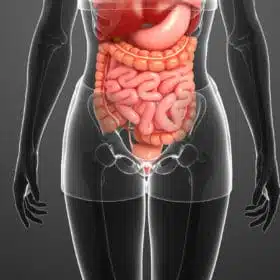Sugar is a food that has permanently changed our world. Both for the better and for the worse. Because while we wouldn't want to miss out on treats such as donuts, caramel, a slice of Black Forest gateau and, of course, grandma's Christmas cookies, many people unfortunately overdo it with their sugar consumption. And it's clear what this leads to at the end of the day - massive obesity and serious health problems. Avoiding sugar is not necessarily easy, however, as it is not always easy to see at first glance where it is to be found. Ready meals, muesli, ketchup, fruit yogurts and the like often contain a lot of hidden sugar. We'll show you how you can massively reduce your sugar consumption.
Why are we so susceptible to sugar?
To understand why we humans are so susceptible to sweet sins, we need to take a closer look at our bodies. And at this point, a clear insight emerges: just as a car engine is a diesel or petrol engine, our body is a carbohydrate machine that is optimized for the energetic utilization of carbohydrates. And the faster or easier this energy is available, the better the body thinks. Sugar, as found in many products, is nothing more than a short-chain carbohydrate that is quickly absorbed into the bloodstream and can be utilized for energy.
Another component is simply evolution. Even breast milk has a slightly sweet taste due to the lactose. From our very first moments in the world, our brain is trained to associate sweetness with energy-rich food. However, sugar is also an excellent flavor carrier, which makes it all the more irresistible. Our parents are also not entirely innocent in the fact that we are still so "into" sugar in adulthood. After all, sweets are very often used as a reward or consolation.
We don't actually need artificial sugar
Admittedly, artificial is definitely the wrong word, as granulated sugar is still obtained from both the sugar cane plant and sugar beet. In this context, artificial rather means that we do not need to supply our body with this "simple" form of sugar in order to ensure an optimal energy supply for our muscles and brain. After all, our body is capable of breaking down almost any food into glucose or converting it into glucose. Incidentally, this works not only with carbohydrate sources such as pasta, bread and fruit, but also with meat, fish and dairy products.
Granulated sugar should therefore be seen for what it really is: a stimulant and not a food. As a stimulant, it ranks right alongside alcohol. For a healthy life, it is therefore advisable to treat it in the same way as alcohol. Just as a glass of wine or a glass of Scottish single malt whiskey is only for enjoyment and is okay, so is a slice of cake or a cone of ice cream. It only becomes problematic if consumption is too high. Accordingly, the World Health Organization recommends consuming no more than five percent of your daily energy requirement from sugar.
Too much sugar consumption has bad consequences
According to the latest statistics from the World Health Organization (WHO), every German citizen eats an average of 100 grams of sugar. And not just once a week, but once a day. That is the equivalent of 35 sugar cubes or 400 kilocalories. It is obvious that such massive sugar consumption cannot be healthy. But what are the specific consequences of sugar consumption? For decades, fat was considered the number one enemy of health.
No wonder this myth has persisted to this day and numerous "avoid the evil fat" diets still adorn the covers of various tabloid magazines. However, this view has since changed, as fats, and unsaturated fatty acids in particular, are vital for our bodies, meaning that cutting them out would actually be counterproductive. Sugar, on the other hand, is increasingly becoming the focus of health scientists, and rightly so, as there is now a great deal of solid evidence that excessive sugar consumption is directly linked to lifestyle diseases such as high blood pressure, obesity, tooth decay and diabetes.
The figures are indeed alarming, as one in five people in this country is now not just overweight, but obese. In addition, a good eight percent of the population suffer from diabetes. However, as the World Health Organization confirms, this is not just a German problem, but a global issue. After all, diabetes and its complications alone generate health costs of 25 billion euros per year worldwide! And the trend is rising.
The vicious circle of sugar
To illustrate the effect of sugar on your body once again, let's take a brief look at the vicious circle that sugar sets in motion in your body immediately after consumption. As soon as you have the first bite in your mouth, it mixes with saliva and, together with bacteria, forms an acid that attacks the tooth enamel. The acid effect is of course particularly strong if you don't eat anything sugar-free afterwards or rinse with water, for example.
After a good 15 to 30 minutes, the sugar has already passed through the stomach and reaches the blood via the small intestine. The pancreas reacts to this stimulus by releasing the key hormone insulin. This ensures that the sugar can enter the cells. If your muscle glycogen stores are full, the excess sugar is converted into fat and ends up on your hips. But that's not all, because the more sugar is absorbed at the same time, the more likely our body is to react with stress, which, among other things, drives up the heart rate.
After a good 45 minutes, the "dangerous" effect of sugar sets in, the mood high. After all, sugar causes the happiness hormone dopamine to be released. It is not said for nothing that chocolate makes you happy. This, in turn, often leads to rash decisions, such as reaching for another chocolate bar or a third piece of cake.
However, it only becomes really problematic after a good hour. This is when the body has managed to lower the blood sugar with the help of large amounts of insulin. However, the blood sugar drops so low that it even falls below the initial value. The result is hypoglycaemia, which sets off several alarm bells in the body. The consequences: Cravings, irritability and mood swings. And the vicious circle starts all over again at the latest when you start craving sweets.
10 tips to help you reduce your sugar consumption
1. check your sugar consumption
Even the great Chinese general knew that only those who know both themselves and their enemy can win a war. So the first step is to keep a food diary and analyze how much sugar you actually consume on average. As soon as you know where your biggest problem areas are, it will be much easier for you to break away from this behavior
2. read the labels on packaging
Yes, the EU is trying to establish strange things like food traffic lights. However, colorful pictures that are faithfully followed do not change the awareness of a healthy diet. A small digression: due to their fat content, even healthy foods such as salmon or nuts would not be labeled green, but rather yellow or even red. So what are you left with? Read the labels: When it comes to sugar, things are particularly tricky, as there are now as many as 70 names for sugar. So that we don't have to list them all here, you can simply remember the rule of thumb that ingredients with the endings "-syrup" and "-ose" are sugar. The more of these ingredients you find in a product, the more likely it is that you should avoid it.
3. consume more fluids
When hunger strikes, it's usually not far before you reach for something sweet. To reduce this risk, you should make it a habit to counteract your hunger with drinks. Of course, only drinks that are largely calorie-free and sugar-free, such as teas and water, are suitable here. The extra liquid fills your stomach, which expands it and makes you feel full.
4. more spices used
Even though sugar is an excellent flavor carrier, this does not mean that sugar is your only option when cooking or preparing desserts. Strong spices such as vanilla, cinnamon and cardamom are excellent sugar compensators, especially in desserts.
5. never go shopping with a growling stomach
This rule falls into the same category as Snickers with its slogan "you're not you when you're hungry". And there is a lot of truth in this, because people who are hungry tend to buy more products that fall into the "sugar bomb" category. This has now been proven beyond doubt by scientific studies. So it's better to eat your fill before you go shopping for the week.
6. focus on a high-protein diet in the evening
If you reduce your carbohydrate consumption towards the evening, you run less risk of having another sweet midnight snack. The reason for this is the drop in blood sugar levels and the reduced satiety that short-chain carbohydrates in particular promise. Instead, opt for meat, fish, dairy products, beans and vegetables in the evening to ensure a long-lasting feeling of satiety and the best possible nutrient supply.
7. do not stay up too late after your last meal
The longer you stay awake after your last meal, the more likely you are to get hungry again and then reach for something sweet. This is of course due to the fact that your body has already metabolized your last meal and is now crying out for new fuel. If you simply sleep through this phase, you massively reduce your risk.
8. find a comrade-in-arms
Everything is easier to stick to if you do it together. According to the old saying "a problem shared is a problem halved", this also applies to giving up sugar. Find a good friend who shares your goal and with whom you can talk about your problems and successes. Small private duels also increase motivation.
9. avoid sweet snacks between meals
If you get hungry between meals, you shouldn't reach for a chocolate bar or a raisin bun. It's not for nothing that our grandmothers have always told us that sweets are no cure for hunger. Hearty snacks such as nuts, a hard-boiled egg, a protein shake or bread with cheese are a very good alternative.
10. eat less convenience food
As there is a lot of hidden sugar, especially in ready meals, it is obvious that cutting out ready-made products is one of the keys to success. Of course, this doesn't mean that you have to cut out everything; a significant reduction is enough.






